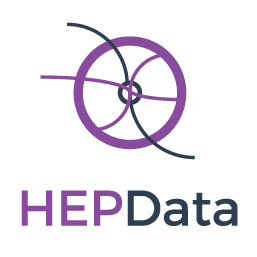Bidirectional linking¶
Linking tables¶
It is now possible (from 22nd August 2023) to enable bidirectional links between HEPData tables possibly in different
records. Applications might include linking theoretical predictions or covariance matrices to their related
measurements. The YAML document specifying the table metadata in the input submission.yaml file should contain a
new field related_to_table_dois comprising a list of table DOIs:
related_to_table_dois:
- 10.17182/hepdata.12345.v1/t2
- 10.17182/hepdata.67890.v3/t4
Please note: This field should not be used for self-referencing, the DOIs inserted should be for OTHER related tables.
You can find the desired table DOI displayed next to the table name on the relevant HEPData record page. It is built
from a common prefix (10.17182/hepdata), the HEPData record identifier (for example, 12345 or 67890), the
HEPData record version (v1, v2, etc.), and the table number within the HEPData record (t1, t2, etc.).
After upload, the related_to_table_dois field is persisted to the database and rendered above the table description
with links to the related tables. The name of the linked tables will be displayed instead of the DOI, with a tooltip
containing their description displayed when the user hovers over the table name.
The linked tables will also display links back to the referring tables, but only after the records containing the
referring tables have been finalised. The backward link is only displayed if the referring record is the most
recent finalised version. The related_to_table_dois field is ignored for uploads to the HEPData Sandbox.
The hepdata_lib tool can be used to write the related_to_table_dois field (see Adding links to related tables).
Linking records¶
In a similar way, bidirectional links can be made between HEPData records, rather than individual tables, via a new
field related_to_hepdata_records added to the first YAML document of the submission.yaml file, for example,
alongside the comment and additional_resources. It should be given as a list of HEPData record identifiers:
related_to_hepdata_records:
- 12345
- 67890
Please note: This field should not be used for self-referencing, the IDs inserted should be for OTHER related records.
Note that the HEPData record identifier must be given as an integer (not a string) and it differs from the INSPIRE
record identifier often found after ins in a HEPData record URL. You can find the HEPData record identifier from
the integer after the prefix 10.17182/hepdata in the HEPData record DOI displayed alongside the publication
information in the left-hand panel of a HEPData record.
Again, after upload, the related_to_hepdata_records field is persisted to the database and rendered in the
left-hand panel of a HEPData record with links to the related records. A tooltip containing the title of the linked
record is displayed when the user hovers over the record identifier. The linked records will also display links back
to the referring records, but only after the referring records have been finalised and if the referring record is the
most recent version. The related_to_hepdata_records field is ignored for uploads to the HEPData Sandbox.
The hepdata_lib tool can be used to write the related_to_hepdata_records field (see Adding links to related
records).

